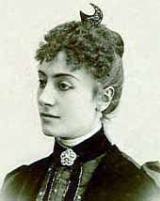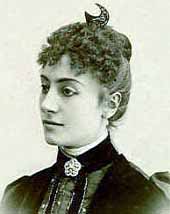
Nozze istriane
Encyclopedia
Nozze istriane is an opera
in three acts by Antonio Smareglia
to an Italian libretto
by Luigi Illica
. It premiered on 28 March 1895 at the Teatro Comunale in Trieste
.

Marussa and Lorenzo, two young villagers, are in love. However, a more wealthy suitor, Nicola, has said that he would waive a dowry
. Marussa's miserly father, Menico, is convinced by the village fiddler, Biagio, to marry her off to Nicola. Marussa is tricked into believing that Lorenzo has been unfaithful, and her wedding to Nicola is quickly arranged. In her room, shortly before the wedding, Marussa begs Nicola to release her from their engagement. Nicola refuses, and Lorenzo (who had been hiding behind the curtains), leaps out and attacks Nicola with a knife. During the fight, Nicola stabs Lorenzo, who dies in Marussa's arms..
Opera
Opera is an art form in which singers and musicians perform a dramatic work combining text and musical score, usually in a theatrical setting. Opera incorporates many of the elements of spoken theatre, such as acting, scenery, and costumes and sometimes includes dance...
in three acts by Antonio Smareglia
Antonio Smareglia
Antonio Smareglia was an Austro-Hungarian opera composer of Italian ethnicity.-Life:Antonio Smareglia was born in the town of Pola , in a house on Via Nettuno which still stands and in which there is now a small museum of his life and work...
to an Italian libretto
Libretto
A libretto is the text used in an extended musical work such as an opera, operetta, masque, oratorio, cantata, or musical. The term "libretto" is also sometimes used to refer to the text of major liturgical works, such as mass, requiem, and sacred cantata, or even the story line of a...
by Luigi Illica
Luigi Illica
Luigi Illica was an Italian librettist who wrote for Giacomo Puccini , Alfredo Catalani, Umberto Giordano, Baron Alberto Franchetti and other important Italian composers. His most famous opera librettos are those for La bohème, Tosca, Madama Butterfly and Andrea Chénier.Illica was born at...
. It premiered on 28 March 1895 at the Teatro Comunale in Trieste
Trieste
Trieste is a city and seaport in northeastern Italy. It is situated towards the end of a narrow strip of land lying between the Adriatic Sea and Italy's border with Slovenia, which lies almost immediately south and east of the city...
.
Roles
| Role | Voice type | Premiere Cast, 28 March 1895 (Conductor: ) |
|---|---|---|
| Marussa | soprano Soprano A soprano is a voice type with a vocal range from approximately middle C to "high A" in choral music, or to "soprano C" or higher in operatic music. In four-part chorale style harmony, the soprano takes the highest part, which usually encompasses the melody... |
Gemma Bellincioni Gemma Bellincioni Gemma Bellincioni was an Italian soprano and one of the best-known opera singers of the late 19th century. She had a particular affinity with the verismo repertoire and was renowned more for her charismatic acting than for the quality of her voice.-Her career:Matilda Cesira was Bellincioni's real... |
| Lorenzo | tenor Tenor The tenor is a type of male singing voice and is the highest male voice within the modal register. The typical tenor voice lies between C3, the C one octave below middle C, to the A above middle C in choral music, and up to high C in solo work. The low extreme for tenors is roughly B2... |
Roberto Stagno Roberto Stagno Roberto Stagno , was a prominent Italian opera tenor. He became an important interpreter of verismo music when it burst on to the operatic scene during the 1890s; but he also possessed an agile bel canto technique which he employed in operas dating from earlier periods... |
| Menico, Marussa's father | bass | Ruggero Galli Ruggero Galli Ruggero Galli was an Italian operatic bass who had an active career during the late 19th century and early 20 century. He created roles in several world premieres, including Menico in Antonio Smareglia's Nozze istriane , Cesare Angelotti in Giacomo Puccini's Tosca , and Pantalone De' Bisognosi in... |
| Biaggio, the village fiddler Fiddle The term fiddle may refer to any bowed string musical instrument, most often the violin. It is also a colloquial term for the instrument used by players in all genres, including classical music... |
bass | Rodolfo Angelini |
| Nicola | baritone Baritone Baritone is a type of male singing voice that lies between the bass and tenor voices. It is the most common male voice. Originally from the Greek , meaning deep sounding, music for this voice is typically written in the range from the second F below middle C to the F above middle C Baritone (or... |
Tito Scipione Terzi |
| Luze | mezzo-soprano Mezzo-soprano A mezzo-soprano is a type of classical female singing voice whose range lies between the soprano and the contralto singing voices, usually extending from the A below middle C to the A two octaves above... |
Elisa Marconini |
| Peasant men and women of Dignano Vodnjan -Geography:Vodnjan is situated 10 km north of Pula, on elevation of 135 m. It is located at the intersection of the main road Buje - Pula and the regional road Vodnjan - Fažana, as well as on the railroad Divača - Pula.-Demographics:... |
||
Synopsis

- Time: 1895
- Place: The village of DignanoVodnjan-Geography:Vodnjan is situated 10 km north of Pula, on elevation of 135 m. It is located at the intersection of the main road Buje - Pula and the regional road Vodnjan - Fažana, as well as on the railroad Divača - Pula.-Demographics:...
Marussa and Lorenzo, two young villagers, are in love. However, a more wealthy suitor, Nicola, has said that he would waive a dowry
Dowry
A dowry is the money, goods, or estate that a woman brings forth to the marriage. It contrasts with bride price, which is paid to the bride's parents, and dower, which is property settled on the bride herself by the groom at the time of marriage. The same culture may simultaneously practice both...
. Marussa's miserly father, Menico, is convinced by the village fiddler, Biagio, to marry her off to Nicola. Marussa is tricked into believing that Lorenzo has been unfaithful, and her wedding to Nicola is quickly arranged. In her room, shortly before the wedding, Marussa begs Nicola to release her from their engagement. Nicola refuses, and Lorenzo (who had been hiding behind the curtains), leaps out and attacks Nicola with a knife. During the fight, Nicola stabs Lorenzo, who dies in Marussa's arms..
Recording
- Antonio Smareglia: Nozze istriane – Ian Storey (tenor), Katia Lytting (mezzo-soprano), Svetla Vassileva (soprano), Enzo Capuano (baritone), Giorgio Surjan (bass), Alberto Mastromarino (baritone); Teatro Verdi di Trieste Orchestra and Chorus; Tiziano Severini (conductor). Live performance recording from the Teatro Lirico Giuseppe Verdi, December 1999. Label: Bongiovanni BGV 2265 king

